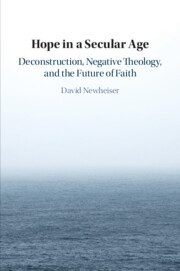Book contents
- Hope in a Secular Age
- Hope in a Secular Age
- Copyright page
- Epigraph
- Contents
- Acknowledgements
- Introduction
- Chapter 1 Deconstruction
- Chapter 2 Negative Theology
- Chapter 3 The Discipline of Hope
- Chapter 4 Beyond Indeterminacy and Dogma
- Chapter 5 Atheism and the Future of Faith
- Chapter 6 Negative Political Theology
- Conclusion
- Bibliography
- Subject Index
Conclusion
Published online by Cambridge University Press: 31 January 2020
- Hope in a Secular Age
- Hope in a Secular Age
- Copyright page
- Epigraph
- Contents
- Acknowledgements
- Introduction
- Chapter 1 Deconstruction
- Chapter 2 Negative Theology
- Chapter 3 The Discipline of Hope
- Chapter 4 Beyond Indeterminacy and Dogma
- Chapter 5 Atheism and the Future of Faith
- Chapter 6 Negative Political Theology
- Conclusion
- Bibliography
- Subject Index
Summary
If someone commends hope without reservation, you ought to be suspicious. Hope connotes positivity and light. It is directed toward that which one desires, and its fulfillment is a cause for rejoicing. It often refers to everyday desires, as in the hope for good weather or for good traffic on the way to work. Under duress, hope can seem like the last anchor to life, as when the hope for a cure encourages someone unwell to struggle toward health. Hope is often prescribed in difficult times. “Keep hope,” one’s friends may say by way of encouragement – or, if they’re especially worried, “Don’t lose hope.” Hope enables people to stave off the darkness, holding on to the promise of better things.
- Type
- Chapter
- Information
- Hope in a Secular AgeDeconstruction, Negative Theology, and the Future of Faith, pp. 154 - 156Publisher: Cambridge University PressPrint publication year: 2019

